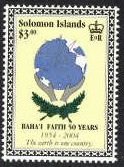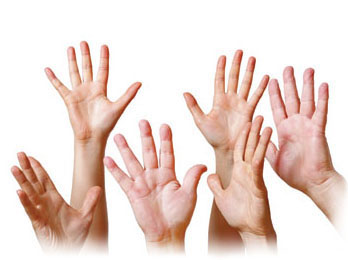Stamp: Globe, hands and laurel branches (Solomon Islands 2005)
Globe, hands and laurel branches (Solomon Islands 2005)
21 March (Solomon Islands ) within release 50th Anniversary Baha´is in Solomon Islands goes into circulation Stamp Globe, hands and laurel branches face value 3 Solomon Islands dollar
| Stamp Globe, hands and laurel branches in catalogues | |
|---|---|
| Michel: | Mi: SB 1207 |
| Stamp Number: | Sn: SB 997 |
Stamp is square format.
Also in the issue 50th Anniversary Baha´is in Solomon Islands:
- Stamp - Globe, hands and laurel branches face value 3;
- Stamp - Alvin and Gertrude Blum face value 5;
- Stamp - Geometric design face value 1.50;
Stamp Globe, hands and laurel branches it reflects the thematic directions:
A globe is a spherical model of Earth, of some other celestial body, or of the celestial sphere. Globes serve purposes similar to maps, but, unlike maps, they do not distort the surface that they portray except to scale it down. A model globe of Earth is called a terrestrial globe. A model globe of the celestial sphere is called a celestial globe
A hand is a prehensile, multi-fingered organ located at the end of the forearm or forelimb of primates such as humans, chimpanzees, monkeys, and lemurs. A few other vertebrates such as the koala (which has two opposable thumbs on each "hand" and fingerprints remarkably similar to human fingerprints) are often described as having "hands" instead of paws on their front limbs. The raccoon is usually described as having "hands" though opposable thumbs are lacking.
Religion is any cultural system of designated behaviors and practices, world views, texts, sanctified places, ethics, or organizations, that relate humanity to the supernatural or transcendental. Religions relate humanity to what anthropologist Clifford Geertz has referred to as a cosmic "order of existence". Different religions may or may not contain various elements ranging from the "divine", "sacred things", "faith", a "supernatural being or supernatural beings" or "some sort of ultimacy and transcendence that will provide norms and power for the rest of life". Religious practices may include rituals, sermons, commemoration or veneration (of deities), sacrifices, festivals, feasts, trances, initiations, funerary services, matrimonial services, meditation, prayer, music, art, dance, public service, or other aspects of human culture. Religions have sacred histories and narratives, which may be preserved in sacred scriptures, and symbols and holy places, that aim mostly to give a meaning to life. Religions may contain symbolic stories, which are sometimes said by followers to be true, that have the side purpose of explaining the origin of life, the Universe and other things. Traditionally, faith, in addition to reason, has been considered a source of religious beliefs. There are an estimated 10,000 distinct religions worldwide. About 84% of the world's population is affiliated with one of the five largest religions, namely Christianity, Islam, Hinduism, Buddhism or forms of folk religion.



